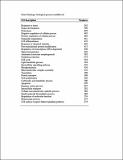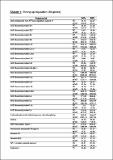Por favor, use este identificador para citar o enlazar a este item:
http://hdl.handle.net/10261/56447COMPARTIR / EXPORTAR:
 SHARE
BASE SHARE
BASE
|
|
| Visualizar otros formatos: MARC | Dublin Core | RDF | ORE | MODS | METS | DIDL | DATACITE | |

| Título: | Dietary vegetable oils do not alter the intestine transcriptome of gilthead sea bream (Sparus aurata), but modulate the transcriptomic response to infection with Enteromyxum leei |
Autor: | Calduch-Giner, Josep A. CSIC ORCID; Sitjà-Bobadilla, Ariadna CSIC ORCID ; Davey, Grace C.; Cairns, Michael T.; Kaushik, Sadasivam; Pérez-Sánchez, Jaume CSIC ORCID | Fecha de publicación: | 11-sep-2012 | Editor: | BioMed Central | Citación: | BMC Genomics. 13(1):470 (2012) | Resumen: | AbstractBackgroundStudies conducted with gilthead sea bream (Sparus aurata L.) have determined the maximum dietary replacement of fish meal and oil without compromising growth or product quality. The present study aimed to analyze the effect of the nutritional background on fish health and fish fed plant protein-based diets with fish oil (FO diet) or a blend of vegetable oils (66VO diet) were exposed for 102 days to the intestinal myxosporean parasite Enteromyxum leei, and the intestine transcriptome was analyzed with a customized oligo-microarray of 7,500 annotated genes.ResultsInfection prevalence was high and similar in the two diet groups, but the outcome of the disease was more pronounced in fish fed the 66VO diet. No differences were found in the transcriptome of both diet control groups, whereas the number of differentially expressed genes in infected groups was considerable. K-means clustering of these differentially expressed genes identified four expression patterns that reflected the progression of the disease with the magnitude of the fold-change being higher in infected 66VO fish. A positive correlation was found between the time of infection and the magnitude of the transcriptional change within the 66VO group, being higher in early infected animals. Within this diet group, a strong up-regulation of many components of the immune specific response was evidenced, whereas other genes related to complement response and xenobiotic metabolism were down-regulated.ConclusionsThe high replacement of fish oil by vegetable oils in practical fish feeds did not modify the intestine transcriptome of gilthead sea bream, but important changes were apparent when fish were exposed to the myxosporean E. leei. The detected changes were mostly a consequence rather than a cause of the different disease progression in the two diet groups. Hence, the developed microarray constitutes an excellent diagnostic tool to address changes associated with the action of intestinal pathogens, but lacks a prognostic value to predict in advance the different susceptibility of growing fish to the current pathogen. | URI: | http://hdl.handle.net/10261/56447 | Identificadores: | http://dx.doi.org/10.1186/1471-2164-13-470 |
| Aparece en las colecciones: | (IATS) Artículos |
Ficheros en este ítem:
| Fichero | Descripción | Tamaño | Formato | |
|---|---|---|---|---|
| 1471-2164-13-470.xml | 99,86 kB | XML | Visualizar/Abrir | |
| 1471-2164-13-470-S2.PDF | 18,91 kB | Adobe PDF |  Visualizar/Abrir | |
| 1471-2164-13-470.pdf | 761,07 kB | Adobe PDF |  Visualizar/Abrir | |
| 1471-2164-13-470-S3.PDF | 12,48 kB | Adobe PDF |  Visualizar/Abrir | |
| 1471-2164-13-470-S1.PDF | 196,87 kB | Adobe PDF |  Visualizar/Abrir |
CORE Recommender
Page view(s)
350
checked on 24-abr-2024
Download(s)
699
checked on 24-abr-2024
Google ScholarTM
Check
NOTA: Los ítems de Digital.CSIC están protegidos por copyright, con todos los derechos reservados, a menos que se indique lo contrario.
